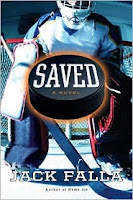I tend to be more of a reader of non-fiction books, but try to throw in some fiction here and there to "keep myself honest" and read a wide variety of stuff... from both categories of work.
That said, I just finished reading
"American Wife" by Curtis Sittenfeld. It's a fictional (i.e. made up) account of first lady Laura Bush and the circumstances of her life and how she wound up married to George W Bush (again, fictional, but with general themes from George W's past that many would recognize). Additional information ranging from author bio to a reading guide for the book can be found at
http://www.curtissittenfeld.com/.

My reaction to the book is both that I was impressed by it and thought it could have been better.
Impressed by ItThe basic genre (if genre is the right term) is fiction, but I think "American Wife" could be further categorized as what I'll call "story of life" fiction.
Similar to
"Straight Man" by Richard Russo (which I finished earlier this year) or
"The Corrections" by Jonathan Franzen (which I'm about halfway through and hope to finish eventually), Sittenfeld's book carries the reader through a life (or at least period of life) history of the main character.
The manifestation of this on the page is Sittenfeld's (as well as Russo's and Franzen's) work comes across as being character as opposed to plot based. One of the thoughts I have reading good character based fiction (especially Franzen's) is "damn, I wish I could write that well." I love the way this type of writing (done well) paints a vivid portrait on the page of who a person actually is.
This is in no way to mean that plot based is bad as there's of course great plot based stuff out there (The
"Twilight" books by Stephenie Meyer and "Harry Potter" books by J.K. Rowling come to mind), but just as I think it's good to read fiction in general, it's also good to read really good character based writing.
I suppose it should also be said that there's fiction writing out there that does both character and plot based well, but it's not common (an example that comes to mind is the character of Howard Roark and circumstances of his life... as written by Ayn Rand in
"The Fountainhead").
Anyhoo... back to Sittenfeld's work. What I liked about it was the portrait of a first a girl and then a woman growing up in small town Wisconsin. Her meeting and then interactions with the character later to become President was a fascinating juxtaposition (if I'm actually using that word correctly). What the reader sees is how someone assimilates into a family and social class completely different than their own and the emotions and actions that then evokes in the main character. This period of the book was really well done.
Thought it Could Have Been BetterInterestingly enough, the part I liked the least about the book was what caused me to read it in the first place. It's marketed (correctly so, I suppose) as a fictional account of Laura Bush and her life with George W, but for me, the book basically ends with the conclusion of the section just prior to the Presidency.
I suppose this ties into one of the problems with this so called "story of life" fiction... you either have to pick a discreet time period (as Russo did in his book) and have it be manageable for the reader or cover it all (as Franzen did) and have the book take forever to get through (much as I love the writing, I don't know when I'll finish it).
What I don't like about Sittenfeld's book is that it feels the final part in the White House is simply tacked on to be able to say "this book is about Laura and George W". However, I would have been just as happy if that last section were treated as simply a post-script paragraph rather than another 100 or so pages.
That said... all the stuff above about the excellent character based writing is true. That in itself I think is enough to make this a solid read.


































